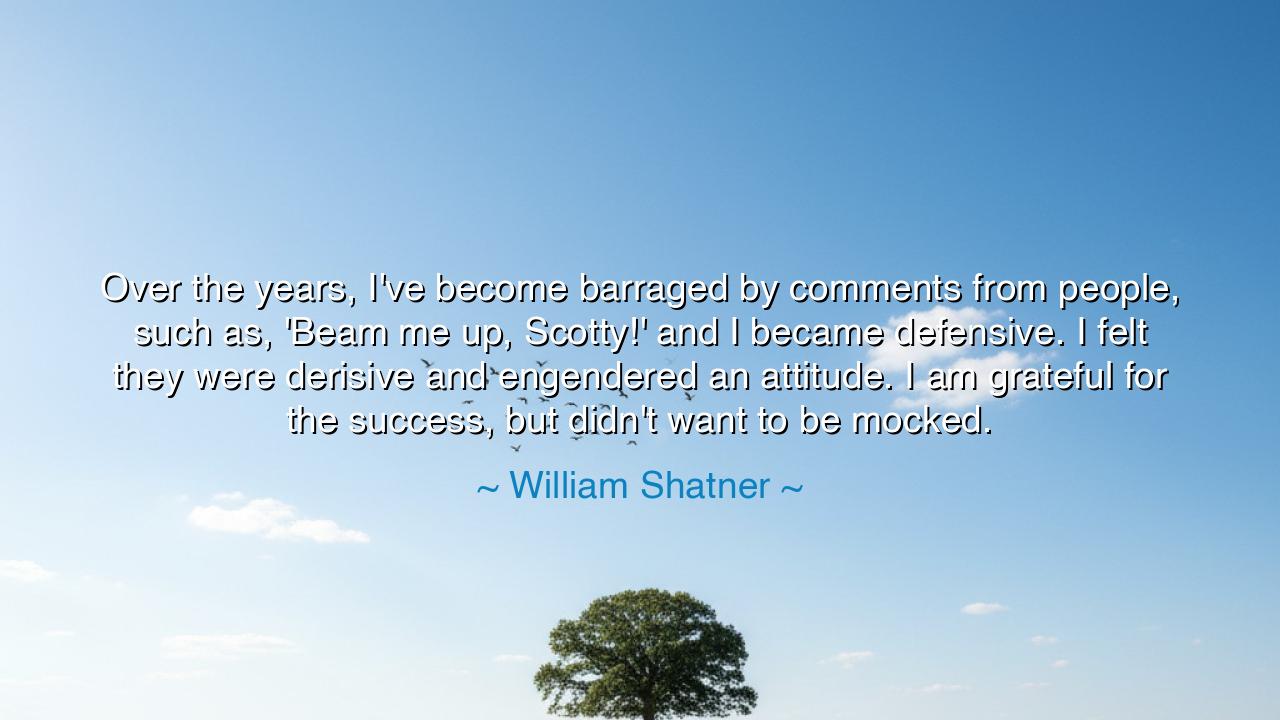
Over the years, I've become barraged by comments from people
Over the years, I've become barraged by comments from people, such as, 'Beam me up, Scotty!' and I became defensive. I felt they were derisive and engendered an attitude. I am grateful for the success, but didn't want to be mocked.






Host: The soft click of a lamp switching on broke the evening stillness. Jack sat on the couch, his eyes scanning the words on his phone, but his mind clearly elsewhere. Jeeny, sitting across from him with a blanket draped over her lap, noticed the far-off look in his eyes and set her book aside, sensing something on his mind.
Jeeny: (gently) “You’ve got that distant look again. What’s going on?”
Jack: (with a slight sigh) “I was just thinking about something William Shatner said. He talked about how, over the years, he kept hearing comments like, ‘Beam me up, Scotty!’ and how, at first, it bothered him. He said he became defensive because those comments felt derisive. He was grateful for the success, but didn’t want to be mocked.”
Host: Jeeny’s expression shifts, a hint of understanding in her eyes. She leans back, her fingers absently curling around her cup, contemplating the weight of his words.
Jeeny: “That’s tough, isn’t it? People always associate him with Star Trek, and while that’s a huge part of his success, it’s hard when it becomes a label, something everyone expects of you, even if it’s not how you see yourself. I get why it would feel like mockery instead of appreciation.”
Jack: (nodding) “Yeah. It’s funny, though. On one hand, he’s grateful for the success, for the recognition. But on the other hand, it’s frustrating when something you’ve worked hard for gets boiled down to just one line or one moment, especially when that moment becomes the punchline of every joke.”
Host: The room grows quiet for a moment, the weight of Jack’s thoughts lingering in the air. Jeeny sits, her fingers still resting on the cup, lost in reflection.
Jeeny: (softly) “It makes me think about how we all get typecast in some way. You do something that resonates with people, something that becomes a part of your identity, but then there’s this pressure to always be that one thing. It’s like your true self gets swallowed by everyone else’s idea of who you are.”
Jack: (looking up) “Exactly. It’s not about rejecting the success or the role that brought you recognition, but more about the limits that others place on you when they only see that one part. It’s almost like being trapped in a moment in time, one that everyone else wants to repeat, but you’re trying to move forward, to show you’re more than just that.”
Host: Jeeny takes a deep breath, her eyes thoughtful as she considers Jack’s perspective. The quiet energy in the room shifts as she continues, her voice calm but filled with understanding.
Jeeny: “I can see why that would be frustrating. Shatner made a whole career out of being more than just Scotty — he’s an actor, a writer, a director, and so much more. But in the eyes of the world, he’s tied to that one phrase, that one role. It’s like, no matter how much you grow, people still see you through that lens.”
Jack: “And the thing is, that one phrase, that one line, it’s almost like it defines you for others. It’s as if everything else you’ve done is secondary, no matter how much you’ve evolved. That’s the hard part — trying to carve out space for your full identity, for everything you’ve done, when people are still stuck on the thing that made you famous in the first place.”
Host: Jeeny’s gaze softens, her voice filled with a quiet sympathy as she looks at Jack.
Jeeny: “But isn’t that the nature of celebrity? People want to hold on to a piece of you, something that they can easily recognize and latch onto. And the artist, the person behind the role, gets caught between appreciation and the desire to be seen for more than what they’re known for.”
Jack: “It’s a double-edged sword, isn’t it? On the one hand, the fame and recognition are things you’re grateful for. But on the other hand, you want to be seen as more than just a character or a moment. You want people to recognize your growth, your other contributions, not just the thing that made you famous.”
Host: The room settles into a quiet silence, both Jack and Jeeny reflecting on the complexity of fame and recognition. The weight of their words hangs in the air as they sit with the understanding that, for many, success comes with both appreciation and limitation — a constant balancing act between embracing what brought you recognition and breaking free from the labels others place on you.
Jeeny: (softly) “It’s a hard balance to strike. But maybe it’s not about rejecting the past, but about redefining it. Showing the world that, yes, this is who I was, but I am also all of this now, too. It’s about taking ownership of the narrative.”
Jack: (smiling) “Yeah. It’s about ownership — owning your story, your journey, and not letting others define you by just one moment in time.”
Host: The conversation drifts into silence, but the understanding between them lingers. It’s a reminder that our stories are more than just the moments others remember. The challenge, and the power, lies in shaping our own narrative and choosing how we want to be seen.






AAdministratorAdministrator
Welcome, honored guests. Please leave a comment, we will respond soon